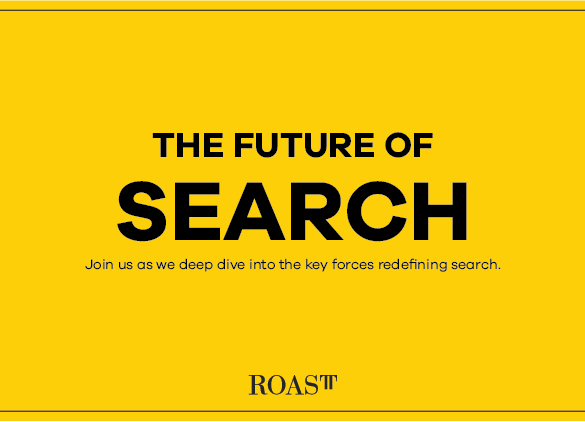
‘Back to School’ with ROAST’s SEO Team: The latest Tools, Tech and Trends
On the 24th of February, we sat down for the second instalment of our ‘Back to School’ webinars, exploring the latest Tools, Tech and Trends across the SEO landscape.
The session was led by Alice Logan, Account Manager at ROAST, who took us through updates within the SEO landscape including Google Core updates and Page experience updates. To end the session, she also delved into Google & Authority.
Watch the session here and find the key point summarised below:
Google Core Updates: What are they and why do we live in fear of them?
Google’s ranking system is made up of a whole series of algorithms, through which minor updates are happening on a daily basis to improve users experience with Google products. Larger ‘Core’ updates also occur often referred to as ‘global updates’ but happen more sporadically.
Why do we live in fear of core updates?
- They can have a significant effect on your sites organic ranking
- We generally don’t know when they will be occurring and they often happen automatically.
This leaves the SEO community out of the loop, and often catching up after an update has occurred. Luckily, the SEO community work together to minimise the impact of the change, by piecing together the impact and drawing insights on the changes.
Core updates, where should you start?
Google works with hundreds of ranking factors in its algorithms, making it difficult to pinpoint a singular ranking factor affected by an update.
Tip: Try looking for steep declines or increases in your websites’ organic performance, this will indicate a high probability that the change has been caused by a ranking factor update.
If you see this performance return to its pre-update baseline, it’s likely that minor issues were caused by ranking factor updates.
Updates can take a week or two to roll out completely, so be sure to factor this in.
Not all updates are bad news for your website, some updates will increase your performance, but make sure you follow SEO best practices to mitigate the impact.
December update
The most recent core update occurred on the 3rd of December with Rank Ranger recording double the number of fluctuations in search engine results pages compared to the previous update.
Impact ranged from declines of 40% in organic traffic to increases in performances up to 150%.
Google & Authority
Google prides itself in connecting users with trusted sources. They use the acronym EAT (Expertise, Authority and Trust) to exemplify this.
But how does Google spot true experts from masquerading experts?
Trust signals
There are various trust signals which Google uses to monitor trust, such as SSL certificates, Domain age, backlinks from authority websites, accurate Whois Information, links to reliable external resources, aggregate ratings and Premium or Unique IP hosting.
What’s next?
Passage Ranking was announced in October 2020 and was rolled out on the 10th of February in the US. This means Google can not only index your page based on different passages but rank it according to that. This helps Google to understand your page as a whole as opposed to on a URL by URL basis.
Increasingly updates seem to be less about ranking factors and more about improving how queries and web pages are understood.
Page Experience update
Page experience is another trust signal in which Google has announced an upcoming update, which is set to come into force in May.
Core Web Vitals
Google has given us a heads up and released a host of information about the upcoming update, particularly through the initiative called Core Web Vitals. This was created to provide unified guidance for quality signals that are essential to delivering a great user experience on the web.
Core Web Vitals adds to the other ‘page experience’ signals, most notably page speed and answers questions like:
- How fast does the page load?
- How fast until it is interactive?
- How fast until it is stable?
Isn’t this the same as page speed?
Improving Pagespeed contributes towards improved performance in Core Web Vitals reports but new metrics are Google’s way of helping us to monitor other factors equally or more important than Pagespeed.
Monitoring
There are a lot of helpful and actionable resources through the Core Web Vitals initiatives to help you prep for the upcoming update.
Google’s Approach to Search
Google is arguably the most popular search engine because of its ability to connect users with quality results.
This has been seen particularly in its evolution from answers to user journeys, shifting from queries to providing a queryless way to get information means we can know surface relevant information without entering a page.
This is linked to no click search wherein different SERP features such as featureless snippets enable users to surface the information they need without entering a site.
Google Shopping is now live
We can now use this feature straight from search for organic results as well as paid search.
The virtual search engine can be accessed through the Google Shopping tab and allows users to research products without leaving Google.
What do these updates mean for us and what should we do about them?
With so many web pages out there, it is critical to ensure yours is genuine and authentic.
Top tip: Think about how you use your website and SEO to position your site as a voice of authority in the increasingly saturated online space.
Customers use organic search to solve problems rather than directly or immediately transact. SEO can be an effective means of inbound marketing, a means to build authority, establish brand recall and generic clicks.
Top tip: Based on the changes that are occurring with Google, it’s time to think of producing content that not only converts prospective customers but engages them and brings them to your website.
If you’d like to chat through any questions with our team, get in touch now. Alternatively, catch up on our ‘Back to School’ webinar with ROAST’s paid media team available on demand.






